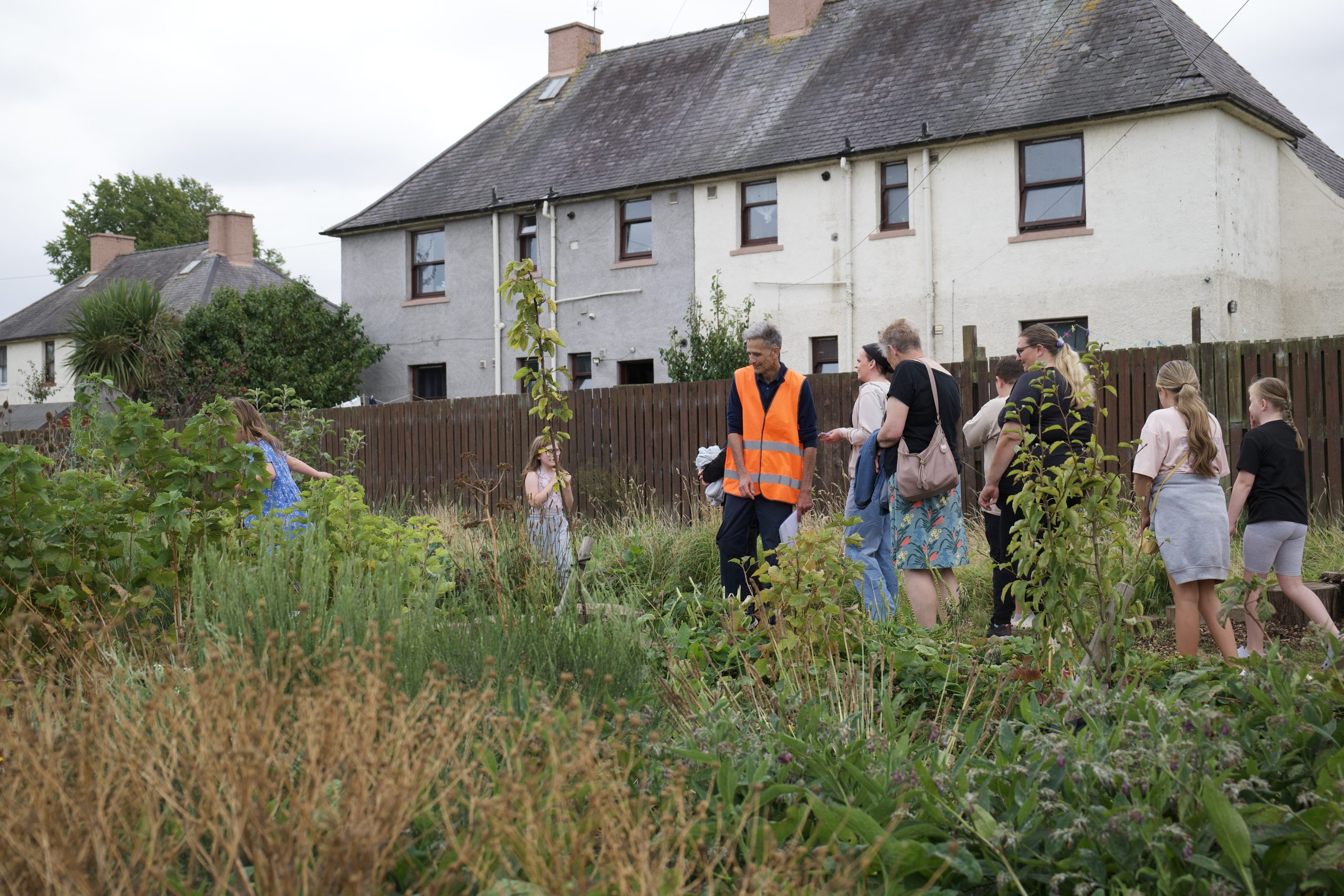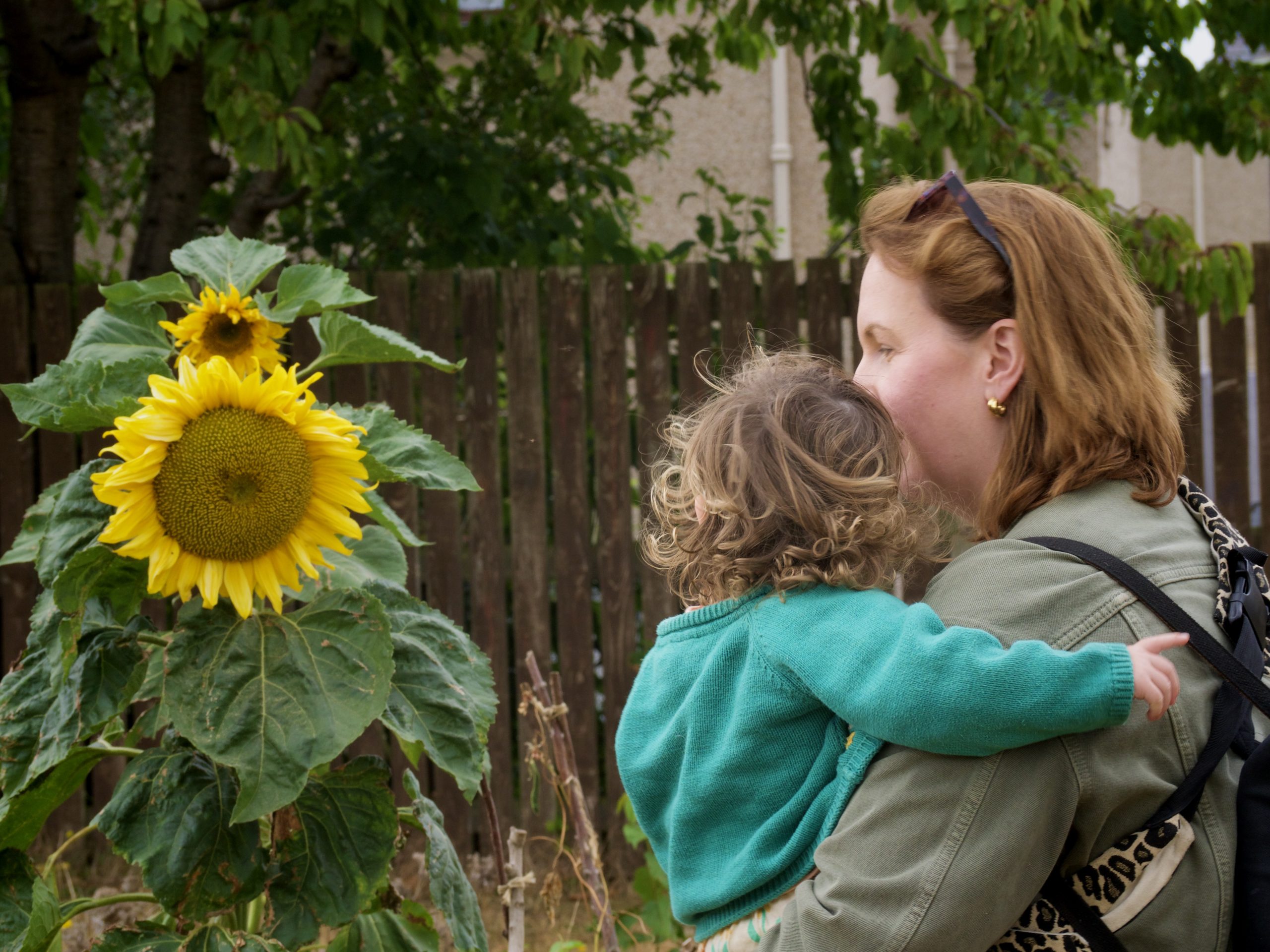On a warm overcast Saturday in August, local residents and community groups from across East Lothian gathered in Tranent to walk the first steps of a biodiversity corridor. Amongst the foliage and birds, we visited two gems of food growing sites: The Forest Garden and the Heugh Community Garden. With the role that food plays in our health, wellbeing, community cohesion, our soils and climate mitigation and resilience, it was a joy to explore such community food growing sites in the heart of the town.
Impacts of the food system
Globally, food systems are responsible for a third of global green house gas emissions. In 2020, the UK imported almost half (46%) of the food it consumed. Food from overseas comes with complications, such as food miles and risk of biodiversity loss. And, climate change is already impacting our food growing. Spain, one of Europe’s main fruit and vegetables producers, has seen extreme dry-spells and floods over recent years, with the 2023 drought affecting 80% of Spanish farms. We are seeing extreme weather impact growing in Scotland too, with the 2023 intense rains resulting in millions of pounds in food crops loss, which included swedes, strawberries and potatoes.
As the climate warms, local food growing as well as more nature friendly and climate-resilient growing are going to be a crucial part of the puzzle for resilient food systems and food security.
What do we want to see?
In 2024, the Food, Farming and Countryside Commission carried out a series of Food Conversations across the UK, with one regional focus being the Lothians. Across the country, participants express concern that the current system is unfair, unhealthy, broken, expensive and unbalanced.
In the Lothians, participants highlighted particular focus on health and wellbeing (particularly free school meals and restrictions on ultra-processed foods), farming (sustainable farming supported through incentives and payments), the environment (policies that penalise polluters while promoting sustainable land use); power (curb corporate power); leadership (stronger governance and inclusive decision-making involving citizens, farmers, crofters and rural communities) and food culture (lifelong food education, cooking skills and celebrating food locally).
Some other ways to support a healthier food system would be through easier access to land in order to grow; tackling cost of living, e.g. rent caps and better regulation on energy costs, to allow people to spend more money on high quality food.

Growing a better food nation
In 2022, Scotland passed the Good Food Nation Act, a landmark piece of legislation that aims to align food with social, environmental, economic and health goals. Key to this is the creation of local good food nation plans by every local authority and health board over 2025/26. You can read the legislative guidelines for these plans here.
Whilst we await legislation from above to support healthier food, communities in East Lothian are taking growing into their own hands. Across the county, there are dozens of projects carrying out local work around food, which includes the Forest Garden and the Heugh that we visited, to the Tranent Muirpark allotments, where East Lothian Food Bank has several plots; to Haddington Community Garden to Phantassie Farm. You can view some of our ELCAN members working on food growing via our members map. Dunbar has an amazing model where locally grown food, from the Ridge to Tyninghame Community Farm, is distributed via local outlets such as the Crunchy Carrot and through the Sunny Soup kitchen. There are a wealth of farms carrying out important work around nature and regenerative practices too.
Furtherafield, you have the co-operative run Penicuik Storehouse, which stocks local and organic food at accessible prices; Edible Estates in Edinburgh which has created 20 new community gardens; to the Brighton Procurement system that ensures local council services are supplied with locally grown food. Up north, a piece of research was carried out resulting in the Can Moray Feed Moray report, which showed 78% of food consumed in Moray could be grown in Moray!
In East Lothian, the Climate Hub has started a Food Growers Collective, to enable local growers to learn together, visit each other’s sites and pool resources where possible. You can learn more and get involved here.
The food system is a key part to remedying our climate, nature, health and community crises.
This is not about telling people what they should and should not buy. It’s about addressing inequality and supporting community agency; supporting and enabling local food growing; supporting farmers with incentives for regenerative practices and supplying locally; rebalancing power and strong policies from above.
More than anything, it is about learning to value food again, and leadership that supports our communities to access good, healthy food that nourishes our bodies, our communities and the land.




